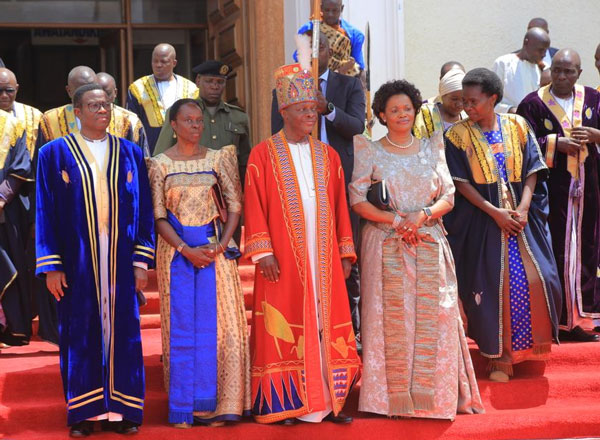
Mengo, Uganda | THE INDEPENDENT | The Kabaka of Buganda Ronald Muwenda Mutebi II has strongly cautioned leaders within his kingdom to reject hypocrisy while offering service and instead adopt courage while delivering genuine and sincere assistance to the people. According to Kabaka Mutebi, leaders ought to exemplify loyalty and courage and set a superior model for the individuals they serve, particularly the younger generation.
“I want our leaders to be an example to those they lead, by showing courage, dedication and service without hypocrisy and back stabbing,” the Kabaka said.
This was part of Kabaka’s remarks during his address at the inauguration of the 31st session of the great Lukiiko at Bulange Mengo. He specifically directed his message toward the newly appointed leaders who had been introduced to him just moments before his speech.
The Kabaka recently made changes within his cabinet, involving the removal and appointment of new ministers. He also selected leaders to fulfill roles within the kingdom’s various departments, counties, sub-counties, and representatives within the Lukiiko.
In the course of Monday’s Lukiiko session, as is customary, the newly appointed leaders were presented before the king. This was done to express their gratitude to him for choosing them to assist in serving his subjects.
The Kabaka emphasized that for the kingdom to excel in delivering improved services, leaders must reject hypocrisy and adopt transparency. He said this commitment to service will demonstrate the kingdom’s capability to provide enhanced assistance.
Furthermore, he urged his subjects to meticulously assess the performance of the kingdom’s leaders, ensuring that they fulfilled their duties as expected.
The foundation of the Buganda kingdom rests on a dual structure of leadership, encompassing both the clan system and a distinct group of individuals selected by the king. These chosen men and women bear the responsibility of providing essential services.
While this system has historically bolstered Buganda’s stability, there have been occasions where elements of deception and insincerity have infiltrated the ranks of those entrusted to serve. In certain historical junctures, the actions of such individuals have inflicted significant setbacks upon the kingdom.
In addition to discussing leadership matters, Kabaka Mutebi also underscored the importance of his subjects giving prominence to agriculture despite the challenges posed by market limitations and price fluctuations. To ensure the vitality of agriculture, the Kabaka suggested a strategy to advocate for the integration of agriculture as a significant subject in the education curriculum, starting from primary levels up to secondary education. To him, this approach can enhance the promotion of agriculture, recognized as the backbone of the country.
Considering the intrinsic link between agriculture and land, the Kabaka, speaking in a moment of profound silence, alluded to the pressing issue of land evictions. He emphasized the necessity of addressing these concerns promptly and effectively. He urged for expedited legal proceedings in these cases, recognizing that the prolonged nature of such disputes has been causing significant harm to the involved parties.
Addressing the Kabaka, Katikiro Charles Peter Mayiga highlighted the significant role of the Lukiiko within the kingdom. He explained that every five years, the Lukiiko crafts a comprehensive plan based on the Kabaka’s message, implements it, and subsequently develops budgets to facilitate the delivery of services.
He referenced the Kabaka’s 30th coronation speech, in which the Kabaka had urged his subjects not to fall into complacency. Mayiga assured the Kabaka that he and his fellow leaders would not become complacent, but would instead serve the subjects with great determination. This commitment, he emphasized, is one of the avenues through which Buganda can reclaim its historical greatness.
The event saw a substantial turnout, attracting not just the Lukiiko’s constituents, but also notable personalities including the Nabagareka, princes, princesses, religious leaders, as well as civil and political dignitaries, among others. Owing to the limitations imposed by COVID-19 protocols and various factors, this gathering had not witnessed a complete attendance since 2019. It’s worth mentioning that in previous sessions, certain rituals had been omitted, and others altered due to the impact of the coronavirus pandemic.
After all the rituals were duly observed, the relatively brief session ended with a ceremonial custom referred to as “greeting the royal drum.” In this practice, the Kabaka took an active role, joining the royal drummers in playing the drum. This age-old tradition took place at the entrance of the Lukiiko.
*****
URN
 The Independent Uganda: You get the Truth we Pay the Price
The Independent Uganda: You get the Truth we Pay the Price


